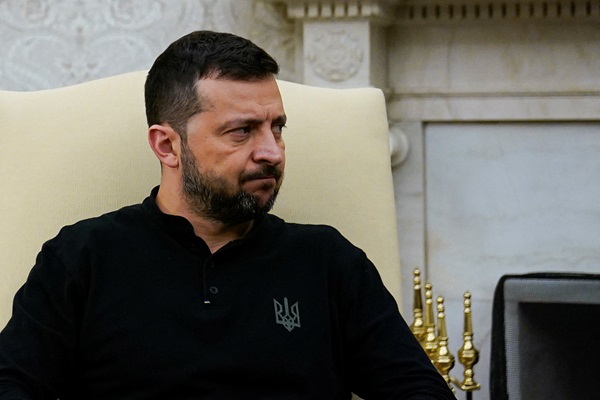 Ukraine's President Volodymyr Zelensky meets with US President Joe Biden (not pictured) at the White House in Washington, US, 26 September 2024;
Credit: Reuters/Elizabeth Frantz/ File Photo
Ukraine's President Volodymyr Zelensky meets with US President Joe Biden (not pictured) at the White House in Washington, US, 26 September 2024;
Credit: Reuters/Elizabeth Frantz/ File Photo
(Reuters) - On Friday 4 October 2024, President Volodymyr Zelensky said he had visited the northern Sumy region, from where Ukraine launched a major incursion into the neighbouring Russian Kursk region.
Almost two months into the surprise operation, Kyiv's troops control swathes of Russian border territory, though the pace of the advance has slowed and Moscow's forces have begun to counterattack.
"It is crucial to understand that the Kursk operation is a really strategic thing, something that adds motivation to our partners, motivation to be with Ukraine, be more decisive and put pressure on Russia," Zelensky said on Telegram.
Shown alongside his top army commander, General Oleksandr Syrskyi, visiting the 82nd Air Assault Brigade, the president thanked the military for defending Ukraine's territorial integrity.
He said the incursion, which Ukraine says is bringing war back to Russia, "has greatly helped" Kyiv to secure the latest military support packages from the West.
"We need to motivate the whole world and convince them that Ukrainians can be stronger than the enemy," he told the servicemen.
Despite the initial rapid success, the Kursk incursion did not manage to significantly distract Russia from its advances in Ukraine's east.
On Wednesday 2 October 2024, the Ukrainian military said it had pulled back from the hilltop town of Vuhledar to avoid encirclement by Russian troops, which have also closed to within about 7 km of the strategic hub of Pokrovsk further north.
Zelensky added that he had held a meeting with his military command, which had discussed the front lines, air defences and the energy situation in the Sumy region. Russia has been pummelling its electricity infrastructure, leading to power cuts.
Separately, Syrskyi said on Facebook that he had recently discussed battlefield and cyber cooperation with General Christopher Cavoli, head of the US European Command, and General Timothy Haugh, head of US Cyber Command.
Syrskyi said he had emphasised the need to strengthen cyber cooperation: "It is important for us to use all available opportunities to achieve superiority over the enemy, both on the battlefield and in cyberspace."








